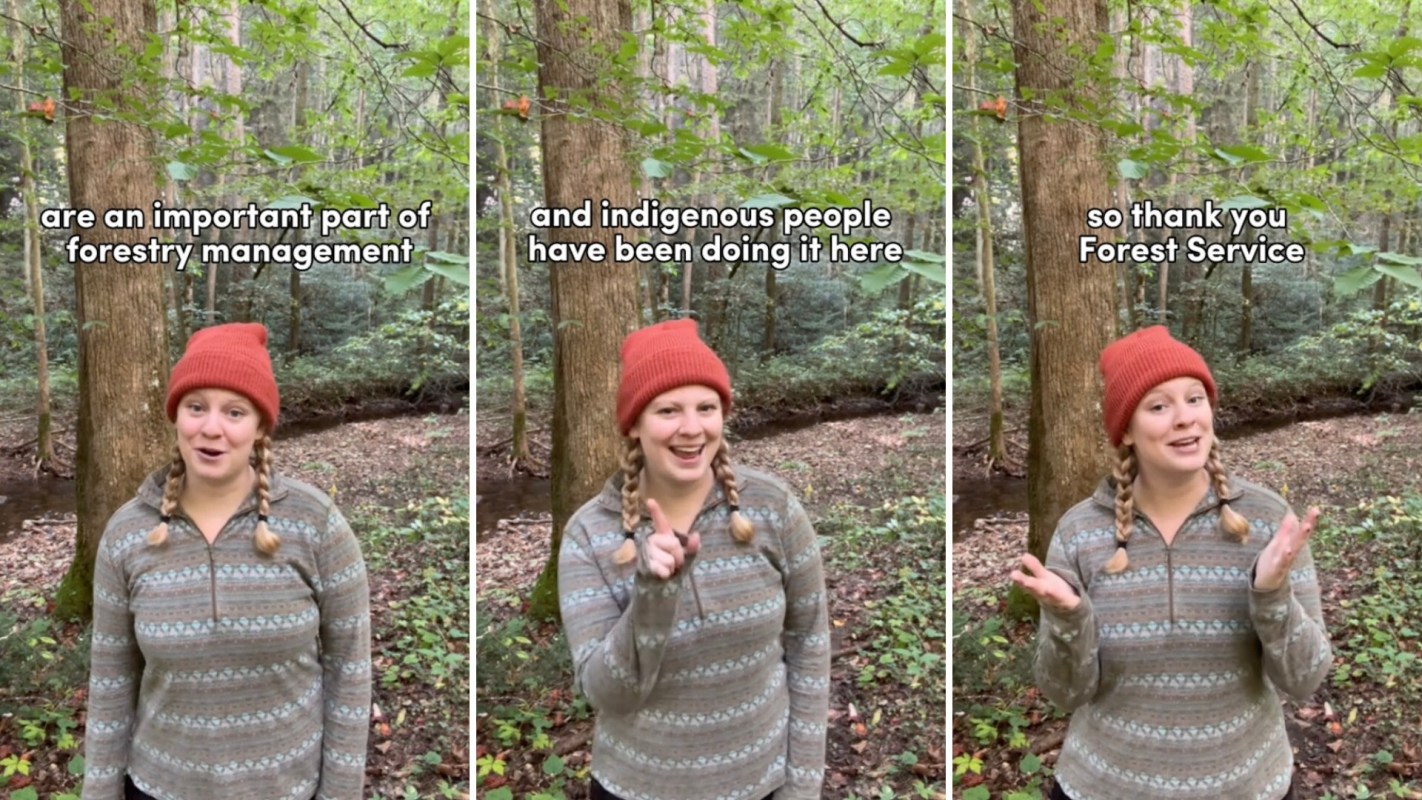Wildfires are wreaking havoc around the globe — from Hawai'i to Canada to Greece to Chile, tens of millions of acres have been scorched just in the past year. So, it seems like a terrible idea to purposefully set fires in forests, but that's precisely what one TikToker suggested.
Sustainability scientist Alaina Wood (@thegarbagequeen) posted a video from a national forest near her home, debunking the popular myth that all wildfires are bad and must be extinguished immediately.
"Around two years ago, there was a prescribed burn here," Wood said while standing in the woods. "I remember when it happened, a lot of people were upset because…fire — but the reality is, prescribed burns are an important part of forestry management."
"Fire plays a vital role in many ecosystems including North American forests and prairies, and Indigenous peoples managed their lands with fire prior to the arrival of European colonists," Wood wrote in the caption of the video.
@thegarbagequeen Not all forest fires are bad I filmed this on the fly with no script, so here's some more information about prescribed burns: Fire plays a vital role in many ecosystems including North American forests and prairies, and indigenous peoples managed their lands with fire prior to the arrival of European colonists. Prescribed burns are used to mimic smaller fires that would have naturally occurred on the landscape, and when they are conducted on a regular basis they help reduce the risk of deadly wildfires by reducing the amount of shrubs, leaf litter, pine needles, and other wildfire fuel in forests. They also increase biodiversity, encourage new growth of native species, minimize the spread of pest insects and disease, and help bring nutrients back into the soil. According to tree ring data, indigenous prescribed burns stopped occurring around the 1850s. Then in the early 1900s intense fire suppression practices were established due to deadly wildfires and the creation of public land agencies. This policy of fire suppression without prescribed burns lasted until the late 1900s when researchers caught up with traditional indigenous knowledge and realized prescribed burns help prevent those deadly wildfires. Now prescribed burns as well as allowing indigenous people to manage their land is becoming more common. #PrescribedBurn #PrescribedFire #Wildfire #ForestFire #Forestry #IndigenousKnowledge #ClimateAction ♬ original sound - Alaina Wood
Prescribed burns are one of the most important tools in preventing massive wildfires. The U.S. Forest Service lists numerous benefits of controlled burning: It reduces hazardous fuels such as shrubs, leaf litter, and pine needles; minimizes the spread of pest insects and disease; removes unwanted species that threaten native species; recycles nutrients back into the soil; and promotes the growth of trees, wildflowers, and other plants.
"According to tree ring data, Indigenous prescribed burns stopped occurring around the 1850s," Wood wrote under her video, explaining that policies changed in the early 1900s. "... This policy of fire suppression without prescribed burns lasted until the late 1900s when researchers caught up with traditional Indigenous knowledge and realized prescribed burns help prevent those deadly wildfires."
Rising temperatures and severe droughts have stoked wildfires. While it's not a good idea to go out and start performing controlled burns yourself, you can do things to help cool down the planet, taking away some of the fuel for these fires.
There are numerous steps we can take in our daily lives to cut down on planet-warming pollution. Making your next car an EV, unplugging energy vampires, and ditching single-use plastics are all good steps to limit your pollution.
People in the comments section were on board with the prescribed burns.
"I think it might help if we talked about prescribed burns as being like exfoliation," one person suggested. "It clears things up and helps promote health."
TCD Picks » Quince Spotlight

Another added: "Not only that but there are some trees that require the temp from burns in order to open their seed pods."
Join our free newsletter for weekly updates on the coolest innovations improving our lives and saving our planet.













